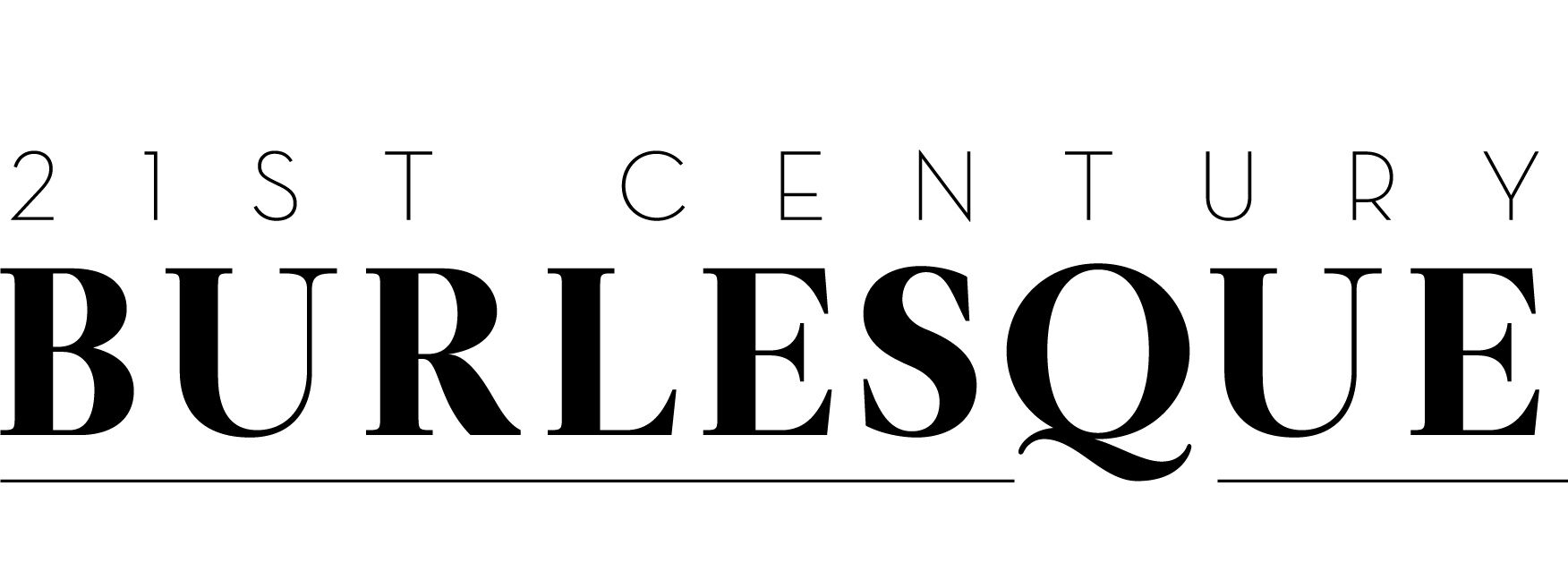As I prepared to profile a renowned performer capable of anything from hula hooping with a popcorn machine strapped to her head and foot juggling umbrellas, to decapitating lemons with a knife ponytail and performing hand puppet abortions, I expected to breeze through the basics.
Hometown? Sandy Point, south of Melbourne, population 80. So far, so good. Age?
The line goes quiet.
‘Uh… I don’t know. Do you?’
We settle on a date of birth and I tell her I’m pretty sure she’s 28.
‘28? Cool, thanks, good to know!’
As our two hour conversation progresses, this blind spot seems less incredulous. Haunting the La Clique spiegeltent throughout the festive season in London’s Leicester Square, Tara Boom is a Post-Dickensian Ghost of Christmas with a timeless energy, toeing the ropes of life, death and loss with astute, benign detachment.
The self-proclaimed ‘numpty of the group’ in dance class who could never remember the steps, young Tara invariably squirmed at the back, inept and shy. Gymnastics, on the other hand, was a language her body completely understood. Here she was skilled, creative. Naughty.
‘I think my brain was just wired differently, you know? I was so cheeky. Teachers saw something subversive in me and encouraged me to play the fool. Australian circus is anarchic and diverse by nature, and cabaret is a home for everyone across all disciplines with a hot stage – you’ve got five minutes to bring your absolute best.’
Remarkably, the Popcorn act she’s arguably most widely known for was her first, conceived at circus school. Not exactly textbook…
‘It all got weird pretty early on! I was in the shower after watching an episode of The Muppets with the Swedish Chef making popcorn on the stove, and bam, that was it. The Muppets has always been a huge inspiration, especially all the sentient everyday objects and food, and the physical comedy.’
Once she found a popcorn machine she could attach to a helmet and a studio that afforded some privacy, she developed the act with a trainer on standby with a fire extinguisher. Office staff commenting on the pervasive scent of popcorn were met with feigned ignorance.
‘I love that sensory element though – how often can you actually smell an act?’
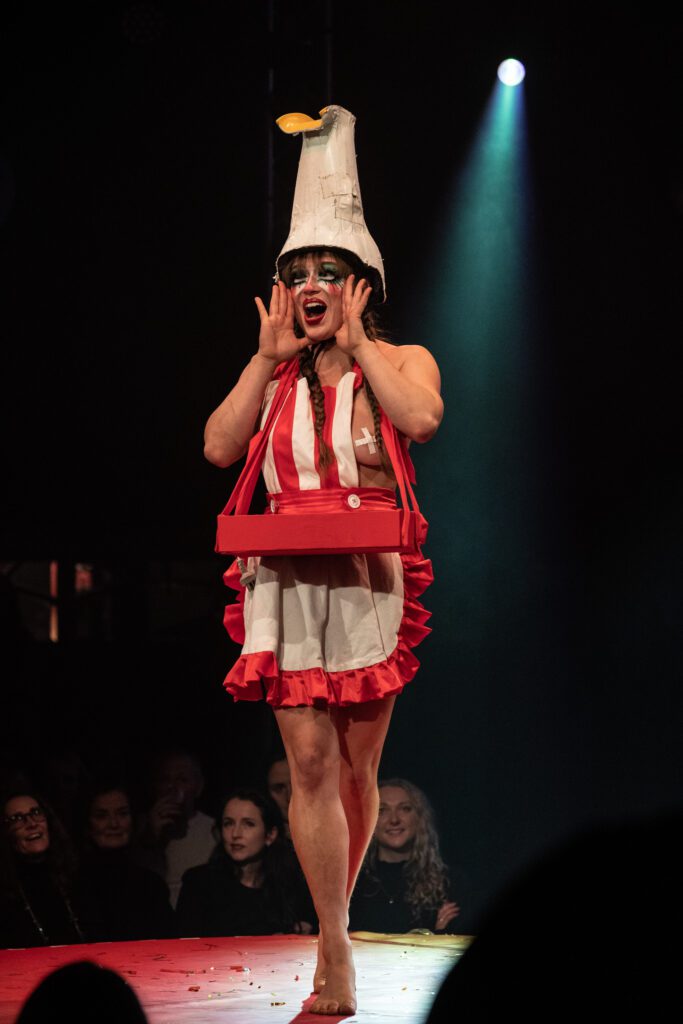
While the sight of a woman in a meagre apron smearing herself in butter and hula hooping furiously as fresh popcorn cascades from above is show-stoppingly absurd in itself, this isn’t a pert, ribald striptease designed to titillate, although the salt packet is produced from precisely where you think it is.
‘I used to have a costume with a giant salt shaker to boot, but it was so annoying to keep washing it all, and one night at Moulin Beige in Melbourne I completely forgot my costume and got the green light to wear nothing.’
‘The little apron was added for the La Clique shows, but it’s totally intentional when a breast falls out the side of it. It’s all a choice in terms of presentation; as soon as you take something off or flash something it’s typically considered inherently sexual. Bodies are stupid, sex is gross and squelchy, noisy and awesome. It’s not, in reality, some polished, sanitised thing.’
Tara’s mother, a staunch 1970s feminist, wouldn’t come and see it for some time.
‘But when she finally saw it, she got what I was doing. As is her way, she went to her bookshelf and pulled out John Berger’s Ways of Seeing, flicking to the chapter on being naked and nude: “To be naked is to be oneself. A naked body has to be seen as an object in order to become a nude. To be naked is to be without disguise.” And that’s exactly how I see it. Clowning is being authentically, nakedly you.’
A costume that produces important results, in Tara’s view, not only for the audience to project their insecurities and inhibitions on to, and reportedly reenact for their partners at home.
‘Perversely it really keeps me in line, too. I get to release my own pent up energy and feelings right back at them. It’s wonderful to be stupid.’
Recently she performed it for children at a Catholic primary school, albeit with the giant shaker and a singlet leotard. ‘They said it was very… visceral!’ she laughs.
Does Tara consider Popcorn a burlesque act?
‘I think I refer to burlesque in its original sense – sending up, poking at societal tropes and dictats. If I’m told to do something a certain way, I want to do the opposite!’
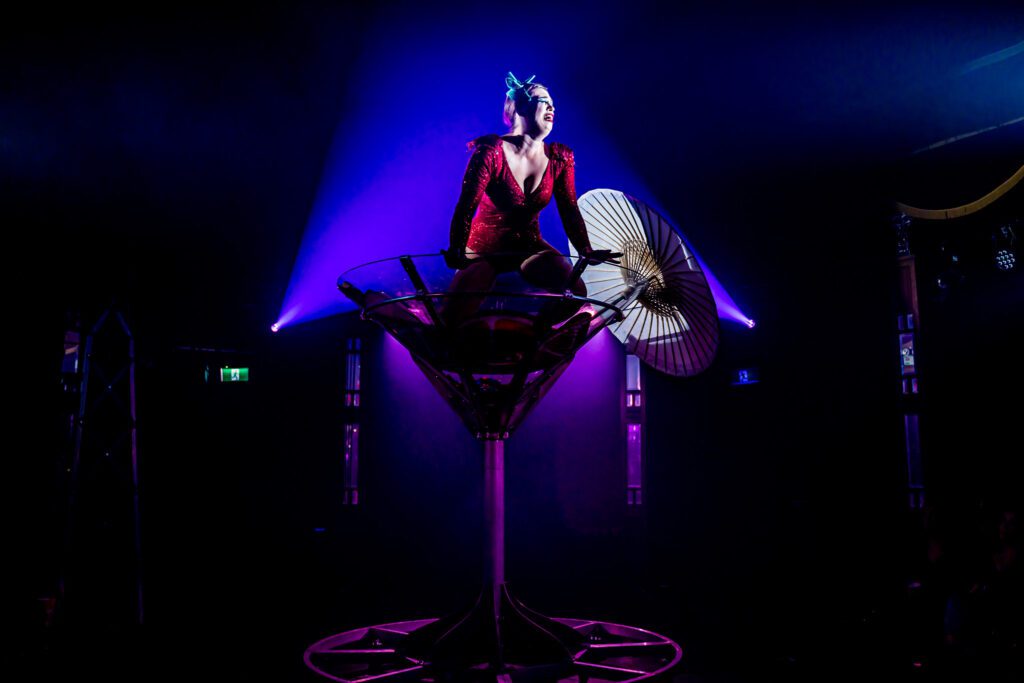
At circus school, Tara put her subversive spin on the well worn but ever popular martini glass burlesque, splashing incoherently as a spiked strawberry, juggling cocktail umbrellas. Was she sending up the artform itself?
‘Burlesque is incredible, I so admire it, but I can’t do it. Or at least, I can’t do the beautiful, polished, classical stuff. I think neo-burlesque is more accessible to me – my friend Jacqueline Furey is an inspiring practitioner!’
We discuss the enviable level of collaboration and camaraderie in circus compared to the often solitary, protective process of developing burlesque acts.
‘Our lives are in each other’s hands, so there has to be trust, feedback and group practice. The more one person succeeds, the more we all do. If you love Briefs, you’ll love Yummy – we’re always recommending each other as a cooperative who survive together.’
Is conflict over copyright and creative theft as common in circus as it is in burlesque?
‘I’d say it’s no different in the circus. I think it gets more murky with technical sequences because they’re easier to steal – but this often comes down to a lack of research or consideration in the self taught. We see first hand what everyone is working on from circus school, and onwards via social media. This can be a starting point for exploration, but should be that – a starting point.’
From the ridiculous to the sublime
The climax of Tara’s spellbinding Umbrella act is perhaps the most filmed and photographed moment of La Clique, and such a drastic contrast to Popcorn you’d be forgiven for thinking it was a completely different artiste.
‘I offer the acts as a pair in one show because it’s good to keep people guessing and mess with preconceptions, but I also knew I needed a more commercially viable act, so I decided to challenge myself.’
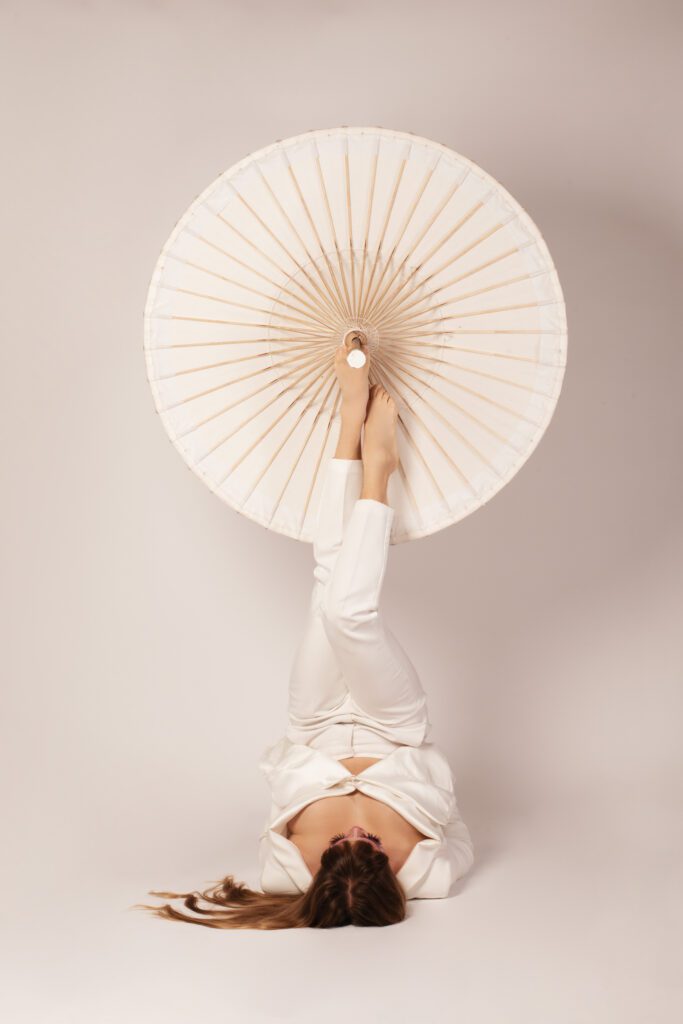
How does one decide to become a foot juggler, of all things?
‘I got into it by accident when I injured both ankles at circus school. I was on crutches for a while and was confined to dull conditioning in the corner at training.
‘A traditional Chinese coach had recently joined and suggested I put a box on my foot and kick it this way and that. What do you know, I’m a natural!’
Tara committed to the speciality from then on, rehearsing in empty studios until she got kicked out. The coach trained her outside of official sessions and off the clock to encourage her talent.
‘My mum likes to take credit for my foot skills, though. We had pickup contests at home growing up, using our feet to grab objects as small as paper clips. I still use my feet to open and close stuff in the kitchen, and I can even tie a shoelace with my feet!’
I remark on the white suit she wears for Umbrella, masculine with an open glimpse of femininity at the same time.
‘I was getting requests for more glamorous, serious acts, like performing my martini glass juggle in an opulent, beautiful gown, but it didn’t feel true to me. When I found the white suit, soft and also masculine as you say, I did feel beautiful and sincere.’
What does she think about during this act, I ask. What to have for dinner, to do list, or just keeping all those umbrellas in the air?
‘Foot juggling becomes pure muscle memory, so I can really focus on connecting with the audience. Popcorn is more responsive with room for improv, but Umbrella puts me in an almost meditative state.’
Tears of a Clown
I pose that there can be something somatic in shock value, and a catharsis in transporting spectacle on stage. I sense Tara nodding.
‘My dad died when I was 19 and at circus school. I knew he would never be there for my key life events, and I think about him during this act and how much I love my job. When I smile around the tent and deeply exhale, I’m sharing what’s in my heart, you know? When do we ever really get to stop for a few minutes in this world and connect, with no words necessary?’
After her dad’s passing and a relationship ending, Tara’s mental health suffered. When she came off the contraceptive pill and developed a meditation practice, she found she could ‘finally compartmentalise [her] emotions’ and identify it as a depressive episode.
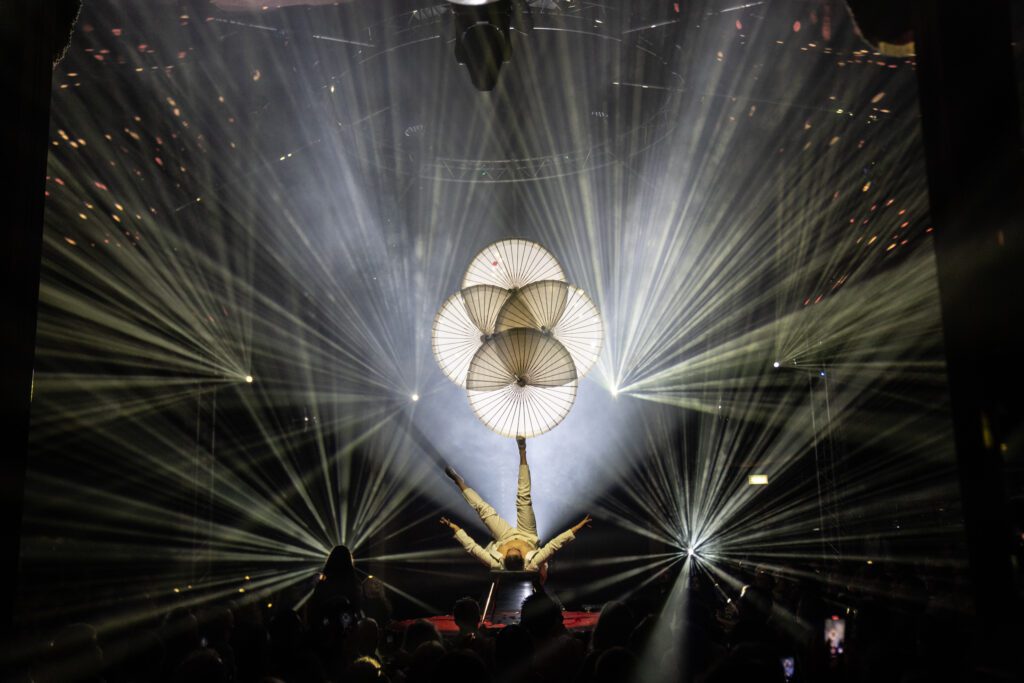
The COVID pandemic was a challenging phase as well, spiritually and professionally.
‘Some people want to be artists, but others need to be,’ she affirms. ‘There was no outlet. People couldn’t get to theatres, and immunosuppressed folks were particularly isolated.’
‘I did an online kids show called Friday Funhouse, among other things. Live performance is integral to the art form, but the screen can be utilised creatively via perspective and angles, which allow for magic. People were calling in from hospitals, or from the confines of their bedrooms. Back in theatres post-pandemic, these people were largely forgotten,’ she sighs.
Things changed when Tara was offered work as a farmhand, planting trees, putting up fences, mucking out pigs and clearing scrap.
‘Being outside during lockdown was a rare gift, for sure, and I’ve never been happier – or fitter! Knee-high in mud in the fresh air, with Mediterranean lunches and good wine.’
Back in the business of show, affluent Londoners with subversive tastes could find Tara at The Box, a notorious Soho club with controversial live entertainment.
‘The Box audience is obnoxious,’ she agrees. ‘Last year I stayed in Finsbury Park, passing a soup kitchen on the way to work in a club where thousands are spent on a single bottle of champagne. It is disgusting, but at the same time I find people from all walks of life fascinating and I’d never usually interact with that demographic.
‘My job is a chance to present other points of view. When I performed in Blunderland in Edinburgh, I was introduced to the concept of giving people what they need, not what they want. You can hide profound messages behind clownery.’
Perhaps the most overtly didactic of Tara’s repertoire is an abortion number in three acts. Flossing her nasal cavity with a burst condom to Grieg’s Morning Mood, foot juggling sperm puppets in battle to fertilise an umbrella egg which blooms into full mitosis, and culminating in an ‘actually adorable’ termination – a classic half-and-half jacket mime with a doctor’s hand administering the pills.
‘Women hug me after this number and tell me about terminations they’ve never talked about before. 1 in 5 women have one – it’s an everyday, commonplace occurrence. The act aims to normalise it, depriving the taboo of oxygen. What’s that Brecht quote? “Art is not a mirror held up to reality but a hammer with which to shape it.”’
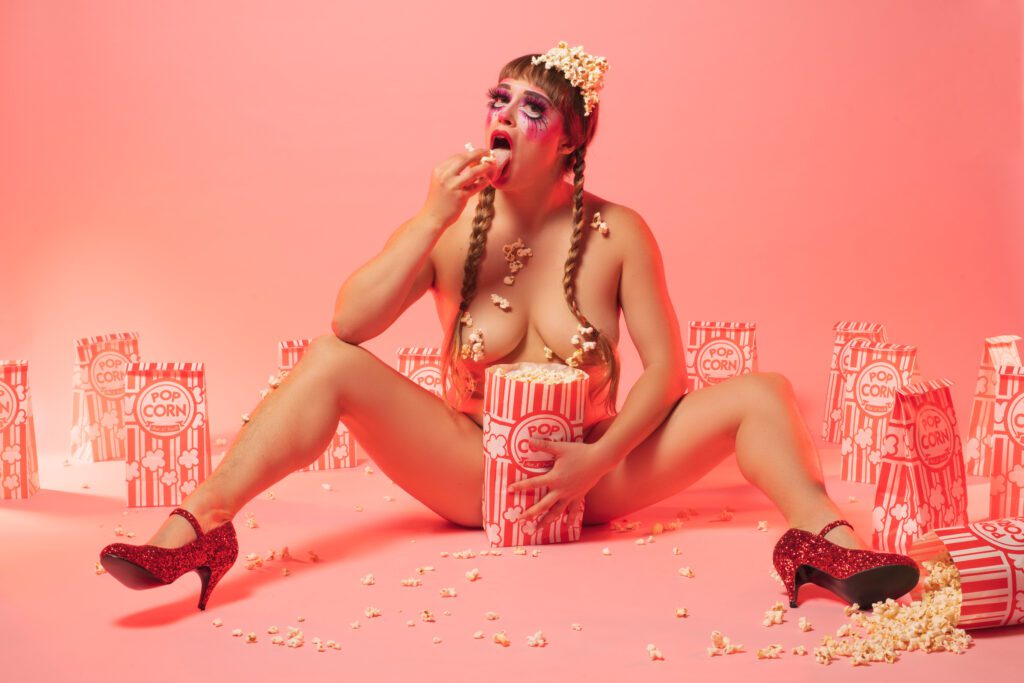
When I compare Tara’s headshots to the manic harlequin face we see on stage, I imagine it’s a mask that allows for creative bravery, as well as anonymity as desired.
‘Oh you can get away with a lot, yes, and leave somewhat anonymously. It’s hard to tell me off with that face. And it’s an intentionally recognisable ‘brand’ face, though I do enjoy varying the colours.’
‘Tara Boom is a keychain,’ she explains, referring to her versatile stage-self in the third person. ‘Different keys unlock different doors. But it’s all utterly, authentically me.’
‘It’s simply more transgressive to make abortion a positive experience, or create a comical polar bear puking plastic in a kids show,’ she continues. ‘Humour and clowning can penetrate minds and manipulate emotions for the greater good.’
Is she finding the increasingly tumultuous post-pandemic world easier to juggle, professionally and personally?
‘I had another period of depression last year, but I’d walk into the Clique tent and everything changed. You can’t be depressed and make popcorn. People need an outlet for their emotions, to feel free, and I’m no exception.
‘The world is a scary place right now, but a day when you don’t want to jump in front of a bus is a great day.’
Catch the unmissable Tara Boom in action in La Clique, Leicester Square, London until January 6 2024.
